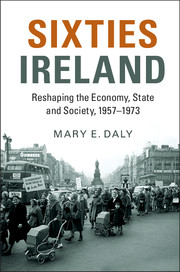Book contents
- Frontmatter
- Dedication
- Contents
- Acknowledgements
- List of abbreviations
- Introduction
- Part I The economy
- Part II Society
- 6 The optimism of a rising tide
- 7 Farewell to ‘the vanishing Irish’
- 8 Women, children and families
- 9 Second-wave feminism and the Irish family
- 10 The churches
- 11 Education, health and welfare
- Part III Politics and international relations
- Conclusion: abandoning the past?
- Bibliography
- Index
8 - Women, children and families
from Part II - Society
Published online by Cambridge University Press: 05 March 2016
- Frontmatter
- Dedication
- Contents
- Acknowledgements
- List of abbreviations
- Introduction
- Part I The economy
- Part II Society
- 6 The optimism of a rising tide
- 7 Farewell to ‘the vanishing Irish’
- 8 Women, children and families
- 9 Second-wave feminism and the Irish family
- 10 The churches
- 11 Education, health and welfare
- Part III Politics and international relations
- Conclusion: abandoning the past?
- Bibliography
- Index
Summary
Women and work
The 1960s afforded women greater opportunities to work as secretaries, clerks and teachers – provided that they had the necessary level of schooling – and much better marriage prospects than in the past, with a hope of settling down in a house with modern amenities. Post-war domestic bliss reached Ireland, just as it was being challenged by an emerging second-wave feminism. There is good reason to believe that many women were content to become full-time wives and mothers, not least because so many of their predecessors had been denied this lifestyle. For most women, paid employment was a transient phase between school and marriage. In the past a significant proportion found themselves in long-term careers, not necessarily by choice (though there exceptions), but because they failed to marry. But women's career options were limited, even when no formal barriers existed. Family and societal expectations and the limitations of the curriculum in girls’ schools were only marginally less effective obstacles than legal restrictions. While more girls than boys attended secondary school, girls were more likely to leave after sitting their intermediate certificate (age fifteen–sixteen) and less likely to attend university. Secretarial courses, nursing or primary school teaching were the standard career aspiration among parents and school principals alike. Although a draft manuscript for a book on careers for girls produced in the early 1960s included sections on veterinary medicine and a ‘lady barrister’, the overall tone favoured jobs that were gendered and conventional. The section on ‘Lady Barrister’ concluded ‘As to whether the lady Barrister is going to be a great success at the Bar, or even to make a living out of it, that is another matter!’, whereas air hostess was ‘an attractive career for girls’, and the chapter on nursing emphasised ‘that a nurse needs to be trustworthy and reliable. She must be sympathetic and patient and keep her good humour despite fearful odds. Some of her patients are frightened and nervous with reason, others are merely foolishly afraid and concerned – but a sick person's fears are very real to himself and he looks to the nurse as a rock in the storm.’ No mention of medical expertise!
In 1966, over one-quarter of women worked in jobs where at least 90 per cent of fellow-workers were women; more than three-quarters were in jobs with a majority female workforce.
- Type
- Chapter
- Information
- Sixties IrelandReshaping the Economy, State and Society, 1957–1973, pp. 151 - 180Publisher: Cambridge University PressPrint publication year: 2016



